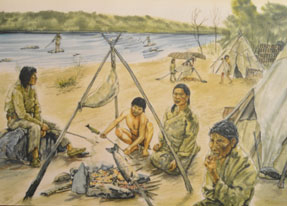
Penouille peninsula
The Mi'gmaq and their ancestors - Forillon’s first inhabitants
Forillon National Park
The Mi'gmaq and their ancestors frequented the territory of Forillon long before the Europeans arrived.
Penouille peninsula

Representation of the first inhabitants of Penouille
The Mi'gmaq and their ancestors came to Penouille on a seasonal basis, seeking their livelihood and fashioning stone tools at this location. Archaeologists believe they began to occupy the terrace dominating the Penouille salt marsh (located on the current Visitor Centre parking lot) about 4,000 years ago. On the Penouille peninsula, traces of indigenous populations date from around 2000 years ago to the early 16th century.
Archaeological excavations conducted on Penouille have offered up an impressive quantity of flaking debris, testifying to the presence of several lithic workshops. Numerous tools and a few traces of fire pits also provide evidence of craft-making and various domestic activities on this site. Terracotta containers were also used to cook foods such as fish and, most likely, seal.
Anse-au-Griffon Valley
The Mi'gmaq and their ancestors also frequented Anse-au-Griffon Valley. This natural corridor was regularly used for portaging across the Forillon peninsula – i.e., from the Gulf of St. Lawrence to Gaspé Bay. Three of the four inventoried archaeological sites are perched upon natural platforms, offering an unobstructed view out over the valley and vicinity.
Related links
- Context to the creation of Forillon National Park
- The French Regime - The first fishing stations
- The English Regime - Families take root
- Archaeological heritage of Penouille
- Grande-Grave - A typical Gaspé fishing village
- L'Anse-au-Griffon Valley - Living from the land and the...
- Cape Gaspé - A lighthouse at Land’s End
- World War II at Forillon's gate
- World War II at Forillon's gate
- A heritage building had to be relocated at Forillon
- Date modified :